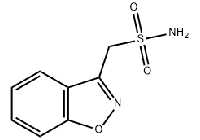Zonisamide, sold under the brand name Zonegran among others, is a medication used to treat the symptoms of epilepsy and Parkinson’s disease. Chemically it is a sulfonamide. It serves as an anticonvulsant used primarily as an adjunctive therapy in adults with Parkinson’s disease, partial-onset seizures; infantile spasm, mixed seizure types of Lennox–Gastaut syndrome, myoclonic and generalized tonic clonic seizure. Despite this it is also sometimes used as a monotherapy for partial-onset seizures.
In 2020, it was the 276th most commonly prescribed medication in the United States, with more than 1 million prescriptions.
Medical uses
Epilepsy
Zonisamide is approved in the United States, and United Kingdom for adjunctive treatment of partial seizures in adults and Japan for both adjunctive and monotherapy for partial seizures (simple, complex, secondarily generalized), generalized (tonic, tonic-clonic (grand mal), and atypical absence) and combined seizures. In Australia it is marketed as both an adjunctive therapy and monotherapy for partial seizures only.
Parkinson’s disease
It has been approved for the treatment of the motor symptoms of Parkinson’s disease (PD), as an adjunct to levodopa, in a few countries such as Japan. In Japan, zonisamide has been used as an adjunct to levodopa treatment since 2009. In addition, there is clinical evidence that zonisamide in combination with levodopa control of motor symptoms of PD but evidence for the treatment of the non motor symptoms of PD lacking.
